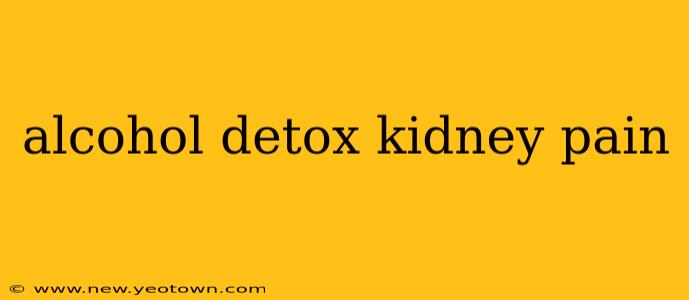The throbbing ache in your kidneys, the constant dull throb that seems to intensify with every movement – it's a familiar discomfort for many undergoing alcohol detox. Alcohol, a notorious diuretic, dehydrates the body and puts significant stress on the kidneys, leaving them vulnerable. This isn't just a minor inconvenience; it's a sign that your body is crying out for help. Let's explore the connection between alcohol detox, kidney pain, and the road to recovery.
My name is Alex, and I've been a registered nurse specializing in addiction recovery for over a decade. I've witnessed firsthand the physical toll alcohol takes on the body, particularly the kidneys. This post is based on my professional experience and aims to provide accurate and helpful information for those struggling with alcohol withdrawal and kidney pain.
Why Does Alcohol Detox Cause Kidney Pain?
Alcohol's impact on the kidneys is multifaceted. It's not merely dehydration; it's a complex interplay of factors:
- Dehydration: Alcohol suppresses the production of antidiuretic hormone (ADH), leading to increased urination and fluid loss. This dehydration concentrates toxins in the bloodstream, placing extra strain on the kidneys as they try to filter them out.
- Inflammation: Chronic alcohol consumption causes inflammation throughout the body, including the kidneys. This inflammation can manifest as pain and discomfort.
- Kidney Stones: Alcohol can contribute to the formation of kidney stones by increasing the concentration of certain substances in the urine. These stones can cause excruciating pain.
- Toxic Buildup: The liver, our primary detox organ, is often overworked during alcohol abuse. When the liver can't keep up, toxins build up, further straining the kidneys.
- Electrolyte Imbalances: Alcohol can disrupt electrolyte balance, which is crucial for proper kidney function. Imbalances can lead to muscle cramps, fatigue, and kidney pain.
How Long Does Kidney Pain Last During Alcohol Detox?
This is a crucial question, and the answer varies greatly depending on several factors:
- Severity of alcohol abuse: The longer and heavier the alcohol use, the longer the recovery period will be.
- Individual health: Pre-existing kidney conditions will prolong recovery time.
- Treatment approach: Medical supervision and proper hydration significantly reduce the duration of discomfort.
While some might experience mild discomfort for a few days, others might have pain lasting for weeks, especially if they haven't sought medical assistance. Ignoring the pain can lead to serious complications. Remember, it's vital to seek professional medical help.
Can Alcohol Withdrawal Cause Kidney Failure?
While acute kidney failure is rare in alcohol withdrawal, prolonged and severe alcohol abuse can significantly damage the kidneys, potentially leading to chronic kidney disease. This is a serious condition that requires ongoing medical management. It’s imperative to address alcohol abuse before irreversible kidney damage occurs.
What are the Symptoms of Kidney Problems During Alcohol Withdrawal?
Beyond kidney pain, watch out for these additional symptoms which may indicate kidney problems during or after alcohol withdrawal:
- Changes in urination: Increased or decreased urination frequency, changes in urine color (darker or foamy urine), and painful urination.
- Swelling: Swelling in the ankles, feet, or face (edema).
- Fatigue and weakness: Extreme tiredness and lack of energy.
- Nausea and vomiting: Persistent feelings of sickness.
- Shortness of breath: Difficulty breathing.
How to Treat Kidney Pain During Alcohol Detox?
Treating kidney pain during alcohol detox is a multi-pronged approach, always under medical supervision:
- Hydration: Drinking plenty of water is paramount to flush out toxins. Your doctor will guide you on the right amount.
- Pain Management: Over-the-counter pain relievers might offer temporary relief, but a doctor should determine the appropriate medication.
- Medical Supervision: This is absolutely essential. Medical professionals can monitor your vital signs, address electrolyte imbalances, and provide the necessary support.
Remember, recovering from alcohol addiction is a journey, not a sprint. It demands patience, perseverance, and professional support. Ignoring kidney pain during detox is extremely risky; seek immediate medical help if you're experiencing discomfort. Your health is a priority.

